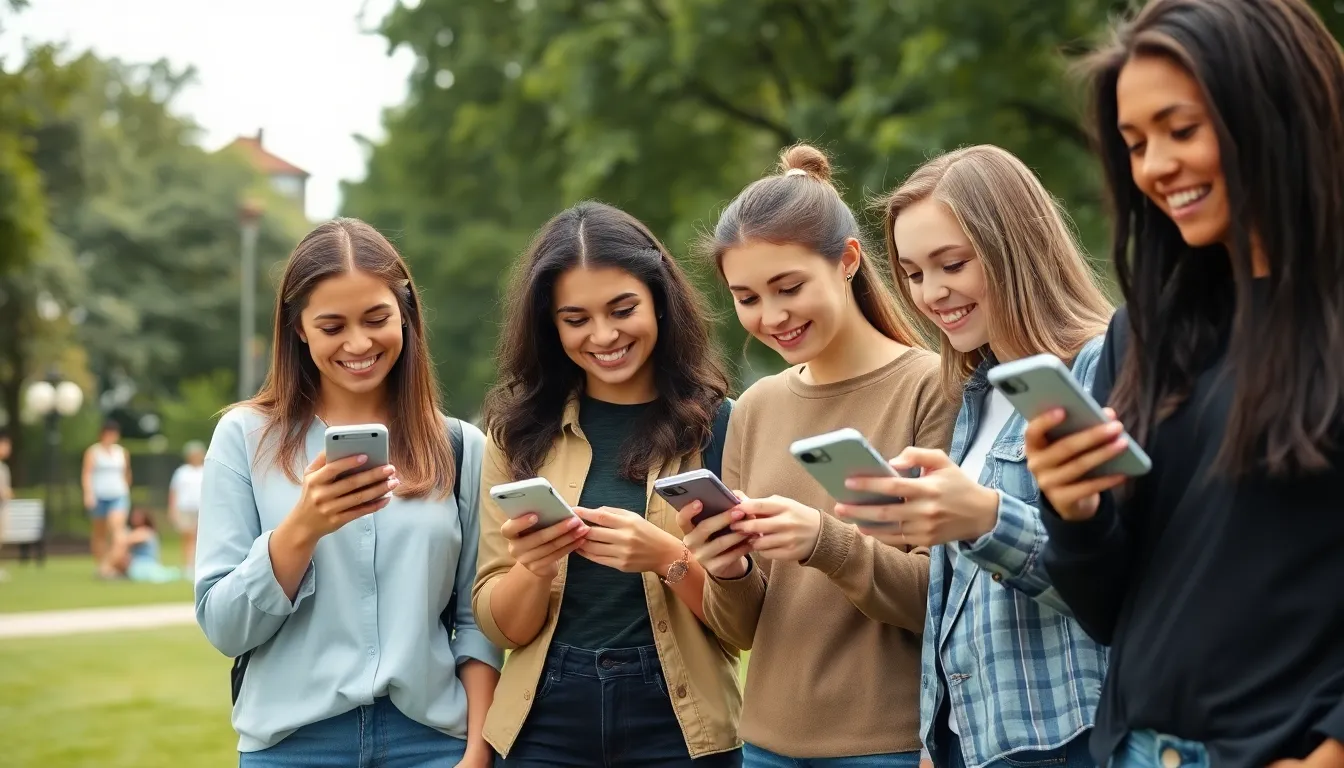In today’s digital playground, social media isn’t just a trend—it’s the main event. With billions of people scrolling, liking, and sharing, it’s hard to ignore the impact these platforms have on everyday life. From connecting with friends to discovering the latest cat memes, social media has woven itself into the fabric of modern society.
But let’s be real: while it’s a great way to keep up with your high school buddy’s avocado toast obsession, it can also feel like a rabbit hole of endless distractions. One minute you’re checking the news, and the next, you’re knee-deep in conspiracy theories about celebrity lizard people. So how does one navigate this wild world of likes and shares without losing their sanity? Buckle up, because understanding social media usage is about to get a whole lot more interesting.
Table of Contents
ToggleOverview of Social Media Usage
Social media usage has reached unprecedented levels, with over 4.9 billion active users globally as of 2023. Individuals utilize these platforms for various reasons, including maintaining connections with friends and family, sharing experiences, and exploring interests. Engagement on social media occurs across multiple demographics, with significant participation among younger generations.
Data indicates that users spend an average of 2 hours and 31 minutes daily on social media platforms. Popular platforms such as Facebook, Instagram, Twitter, and TikTok attract millions of daily active users, fostering vibrant communities. The rapid growth of mobile usage significantly contributes to this increase as users access social media more frequently on their devices.
Conversely, social media also presents challenges. Many users encounter misinformation, cyberbullying, and the pressure to maintain curated online personas. Mental health impacts arise from excessive usage, leading to feelings of anxiety and isolation. Awareness of these potential pitfalls encourages users to engage mindfully with social media.
Trends show a rising awareness of privacy issues, prompting users to prioritize data security. Additionally, businesses increasingly leverage social media for marketing and customer engagement. Research reveals that approximately 73% of marketers believe their efforts through social media have been “somewhat effective” or “very effective” for their businesses.
Ultimately, successful navigation of social media requires balance. Users can benefit from the genuine connections it fosters while remaining vigilant of its downsides. Awareness and strategic engagement support positive experiences in the ever-evolving landscape of social media.
Trends in Social Media Usage

Social media usage continues to evolve rapidly, reflecting shifting user preferences and behaviors. Understanding the latest trends is crucial for navigating this dynamic landscape.
Growth Statistics
As of 2023, over 4.9 billion individuals engage with social media platforms. Users average 2 hours and 31 minutes of daily interaction. This statistic indicates a significant presence of social media in daily routines. Platforms like Facebook, Instagram, Twitter, and TikTok draw vast audiences and foster community building across diverse interests. Continued growth is evident as more people recognize the impact of social media. Companies are responding by investing more in digital marketing strategies.
Demographic Insights
Younger generations dominate social media user bases. Notably, those aged 18 to 29 account for approximately 90% of their age group actively using these platforms. Engagement differs across age groups; however, older users are increasingly adopting social media for communication and information. Gender also plays a role, as women tend to use social media for connection, while men often favor content consumption. Marketers recognize these trends to tailor their strategies effectively. Understanding demographics aids in creating targeted content that resonates with specific audiences.
Impact of Social Media Usage
Social media’s impact on mental health and societal norms is profound and varied.
On Mental Health
Studies show a direct connection between social media usage and mental health issues. Using platforms for over two hours daily often leads to increased anxiety and feelings of isolation. Discouragingly, individuals curating idealized versions of their lives face additional pressure. Cyberbullying and negative interactions significantly contribute to these challenges. The younger the demographic, the more pronounced the effects; approximately 80% of teens report social media’s influence on their self-esteem. Engaging mindfully and actively seeking positive online experiences can mitigate these adverse effects.
On Society and Culture
Social media shapes societal interactions and cultural trends significantly. With close to 90% of 18 to 29-year-olds on these platforms, user-generated content drives cultural dialogues. Networking, advocacy, and activism thrive in this space, empowering marginalized voices. Content shared on social media transcends geographic boundaries, fostering global awareness. The rise in digital marketing demonstrates businesses responding to changing consumer behaviors. Furthermore, social media plays a crucial role in shaping contemporary norms, influencing everything from fashion to political movements.
Best Practices for Healthy Social Media Usage
Healthy social media habits help users maintain a balanced online presence while minimizing negative impacts. Utilizing best practices ensures meaningful engagement in the vast digital landscape.
Setting Boundaries
Establishing boundaries can significantly enhance social media experiences. Scheduling specific times for platform access prevents constant distractions. Users may also find it beneficial to limit screen time, aiming for no more than 30 minutes of continuous usage. Implementing notifications settings minimizes interruptions from alerts and encourages focused interaction. Taking regular breaks helps maintain mental wellness, allowing users to disconnect and reflect. Users often discover a boost in productivity when managing their social media use effectively.
Encouraging Accountability
Personal accountability plays an essential role in healthy social media habits. Sharing goals with friends or family creates a supportive network, reinforcing positive behavior. Users might track their time spent on platforms to identify usage patterns and make adjustments. Engaging in discussions about online experiences can foster a culture of openness and honesty among peers. Many users benefit from evaluating the impact of social media on their emotions and well-being. This proactive approach empowers individuals to prioritize healthy habits, strengthening their online presence while promoting self-esteem.
Future of Social Media Usage
Social media usage is anticipated to transform significantly in the coming years. Trends indicate that platforms will introduce new features, prioritizing user engagement and safety. With over 4.9 billion active users as of 2023, innovative tools may emerge to enhance connections and foster positive interactions.
Younger generations continue to dominate the social media landscape, influencing future designs and functionalities. Approximately 90% of individuals aged 18 to 29 utilize these platforms. This demographic shift drives companies to adapt their marketing strategies to capture attention more effectively.
Anticipated shifts in user preferences suggest increased demand for privacy and data security. Users show greater awareness of how personal information is shared and used across platforms. Consequently, social media companies are expected to implement stricter data protection measures.
Engagement metrics may evolve, focusing on quality interactions over quantity. Brands might prioritize meaningful conversations and community building rather than just follower counts. Studies reveal that women often use social media for connection, while men favor content consumption, shaping targeted marketing efforts.
Advocacy and activism are likely to become central themes within social media interactions. Voices from marginalized communities will gain visibility, driving important cultural dialogues. Users increasingly seek spaces for self-expression and community support.
As the digital landscape shifts, mindful usage practices will gain traction. Recommendations may include setting time limits to promote healthier interactions. Advocates for mental wellness are expected to highlight the importance of regular breaks and reflection on social media impacts.
Emerging trends will shape the future of social media usage, creating a balance between connection and awareness of potential downsides. Strategies promoting positive online experiences will remain crucial as users navigate this dynamic environment.
Social media’s impact on daily life is undeniable. It serves as a powerful connector while also presenting challenges that users must navigate. As the landscape continues to evolve, individuals are encouraged to engage mindfully and prioritize their mental well-being.
The growing emphasis on privacy and data security reflects users’ desire for safer online experiences. Companies must adapt to these shifts, focusing on quality interactions and community building.
By fostering awareness and encouraging balanced usage, social media can remain a vibrant space for connection and expression. Embracing both the benefits and pitfalls will help users cultivate a healthier relationship with these platforms.





